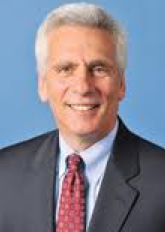Crossposted at On the Economy & The Huffington Post
The following puts together a bunch of stuff I've been posting over the past few months... it's time to start thinking about these ideas in terms of new economic models to replace the old, worn out ones...
The trickle-down, deregulatory agenda -- what I have called YOYO, or "you're on your own" economics -- presumes that the growth chain starts at the top of the wealth scale and "trickles down" to those at the middle and the bottom of that scale. Problem is, that hasn't worked.
Here's a better model. In the midst of the 1990s boom, which lifted the earnings and incomes of middle and low-wage workers much more so than the 1980s or 2000s cycles, Larry Mishel and I started talking about "wage-led demand growth." We meant that a much better way to generate robust, lasting, and broadly shared growth is through an economically strengthened middle class.
At the most basic level, this growth model is a function of customers interacting with employers, business owners, and producers. A recent article by successful venture capitalist Nick Hanauer very compellingly describes this interaction:
I've never been a "job creator." I can start a business based on a great idea, and initially hire dozens or hundreds of people. But if no one can afford to buy what I have to sell, my business will soon fail and all those jobs will evaporate.That's why I can say with confidence that rich people don't create jobs, nor do businesses, large or small. What does lead to more employment is the feedback loop between customers and businesses. And only consumers can set in motion a virtuous cycle that allows companies to survive and thrive and business owners to hire. An ordinary middle-class consumer is far more of a job creator than I ever have been or ever will be.
How does this dynamic interaction show up in the macroeconomy? Economist Alan Krueger, currently serving as Chair of the President's Council of Economic Advisers summarized these findings in a recent speech, in a section on the consequences of economic inequality.
Less robust (or debt-financed) consumption. Seventy percent of the US economy is accounted for by consumer spending, so if that part of GDP lags, economic growth slows. It is also the case that the propensity to consume out of current income is higher among lower-income households (i.e., compared to wealthier households, they're more likely to spend than save their income).
Based on an estimate of these relative propensities and the large shift in the share of national income that accrued to the top 1 percent over the past few decades, Krueger calculates that aggregate consumption could be 5 percent higher in the absence of such large income shifts. Applying rules of thumb on the relationship between aggregate growth and jobs, and assuming both economic slack and that this income was not simply replacing demand elsewhere in the economy, this extra consumption growth could reduce unemployment by 1.75 percentage points, implying about 2.6 million more people with jobs.
[As consumption is 70% of GDP, and each point of GDP above trend reduces unemployment by half a point, this calculation is .7*.5*5%, or 1.75%.]
Krueger cites an important caveat about this type of calculation. In the face of stagnant earnings in the 2000s, many in the middle class borrowed to make up -- or more than make up -- the difference, in which case middle-class consumption did not fall as much as it would have absent this leverage. To point out that this method of improving middle class living standards is both unsustainable and extremely risky is an obvious understatement.
Inequality and longer term growth. Krueger also points to recent research showing that "in a society where income inequality is greater, political decisions are likely to result in policies that lead to less growth." Nobelist Mancur Olsen also hypothesized about this relationship decades ago.
As more income, wealth, and power is concentrated at the top of the income scale, narrow coalitions will form to influence policy decisions in ways less likely to promote overall, or middle-class, well-being, and more likely to favor those with disproportionate power and resources. In the current economics debate, we clearly see these dynamics in a tax code that bestows preferential treatment on those with large amounts of assets, like capital gains and stock dividends, relative to wage earners.
Trickle-down economics, inequality, and incomes. Another piece of evidence with implications for rebuilding a strong middle class comes from new work by economists Emmanuel Saez et al. As shown in the figures from their paper (see here), they use international evidence from a wide variety of advanced economies to examine two key links in the logic of the supply-side chain.
First, they look at the relationship between the top marginal income tax rate in these countries and the change in income inequality. They find a strong negative correlation: in countries like ours that cut the top marginal tax rate, income is a lot more skewed (and note that this refers to pretax income, so the result is not a direct function of the tax policy changes).
(Note: You can view every article as one long page if you sign up as an Advocate Member, or higher).





